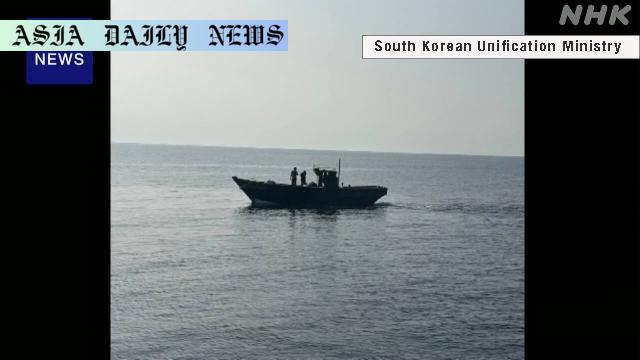Repatriation: South Korea sends back 6 rescued North Koreans in a rare cross-border interaction, signaling potential dialogue.
- Six North Koreans rescued at sea returned to their country by South Korea.
- South Korea used the United Nations Command to inform North Korea of the repatriation plan.
- Speculation exists that North Korea’s response to this move indicates an openness to future dialogue with South Korea.

South Korea Repatriates North Koreans Rescued At Sea
In a significant move showcasing South Korea’s adherence to humanitarian principles, six North Koreans who were rescued at sea earlier this year have been sent back to their homeland on Wednesday. These individuals reportedly drifted into southern waters during separate incidents in March and May and were subsequently rescued by the South Korean military. Upon engaging with the rescued individuals, all six expressed a firm desire to return to North Korea.
The Logistics of Repatriation
The process of repatriation was conducted in a coordinated and carefully planned manner. South Korea ensured that the return was carried out through peaceful means by sending the rescued individuals on an unaccompanied vessel. This vessel crossed the Northern Limit Line, regarded as the maritime border between the two Koreas, early Wednesday morning. Once in Northern territory, the boat was met by what appeared to be a North Korean patrol vessel, signaling the return was appropriately coordinated, albeit without formal acknowledgment from the North.
Communication via International Channels
Prior to the repatriation, the South Korean government communicated its intentions through the United Nations Command, staying consistent with international protocols regarding interactions with North Korea. Despite North Korea not providing any formal response to the notice, the act of dispatching a patrol vessel to receive the returnees suggests implicit acknowledgment from Pyongyang. Experts suggest this development may represent a subtle willingness from North Korea for limited avenues of interaction, a rarity considering the nation’s typically closed nature.
Analyzing the Implications
Experts and political analysts are now closely examining the potential implications of this interaction for the future of inter-Korean relations. The decision of North Korea to mobilize patrolling forces stands out as an unusual gesture that could hint toward an emerging approach for indirect diplomacy or contact. South Korea’s incumbent administration, under President Lee Jae-myung, has expressed hope for fostering dialogue with the North, and this episode may provide an opening for further discussions on cooperative efforts.
Humanitarian Action with a Diplomatic Undertone
While this instance primarily underscores the humanitarian stance of South Korea in rescuing and returning individuals stranded at sea, it also carries potential diplomatic significance. South Korea demonstrated a commitment to international ethics and the rights of individuals by acting on the wishes of the rescued North Koreans. At the same time, by executing the repatriation in such a calculated manner, it has sent a signal of openness to future constructive engagement, providing a moment for reflection amidst the strained relations between the two nations.
Broader Implications for the Korean Peninsula
The Korean Peninsula has long witnessed cycles of tension and limited engagements, making this small yet significant action stand out. The ability to coordinate even a limited operation such as this provides a faint but critical signal of possible communication. While analysts are hesitant to draw sweeping conclusions, there is no doubt that such episodes illuminate both the challenges and opportunities within inter-Korean relations. As Seoul seeks to restructure its interactions with the North, actions like these could form the foundation for future engagement, provided both nations choose to build on these occurrences.



Commentary
Beyond Humanitarian Actions: The Greater Diplomatic Implications of Repatriation
The recent repatriation of six North Koreans by South Korea serves as more than merely a humanitarian action. It paints a broader picture of the delicate dynamics between the two Koreas, sparking discussions about the state of inter-Korean relations and future prospects for dialogue. At a glance, this repatriation may seem like a simple act of goodwill, but its undertones of potential communication contribute to a larger conversation on cooperation and coexistence on the peninsula.
A Rare Opening for Interaction Amidst Tensions
It is undeniable that the Korean Peninsula continues to endure complex and often strained relations between its two halves. Acts of coordination, no matter how limited, have been scarce in recent years. The decision by North Korea to mobilize a patrol vessel, albeit lacking official communication, denotes a rare acknowledgment of the South’s actions. This small yet telling gesture holds symbolic value, reflecting a latent readiness, though guarded, for engagement. Could this action mark a shift in strategies, or is it simply a tactical response from Pyongyang? Time will tell, but such moments deserve attention.
South Korea’s Leadership: Balancing Action and Diplomacy
Under President Lee Jae-myung’s administration, South Korea appears to be emphasizing a commitment to balancing humanitarian action with long-term diplomatic interests. By repatriating the North Koreans in such a non-confrontational manner, the administration has managed to uphold its principles while keeping avenues for dialogue open. Such decisive yet considerate actions carry significant weight in shaping public perception as well as international opinions regarding South Korea’s approach to the divisive inter-Korean issue.
The Road Ahead for Inter-Korean Relations
While this development provides a glimmer of hope, it is insufficient to confidently predict a shift in inter-Korean relations. Interactions between the two nations remain laden with challenges, ranging from ideological divides to geopolitical tensions influenced by global powers. However, small gestures, such as the successful coordination of this repatriation, hold the potential to break the ice, generating momentum for more meaningful discussions in the future. It is now critical for both parties to recognize the value of such openings and to build on them for the long-term stability of the Korean Peninsula.